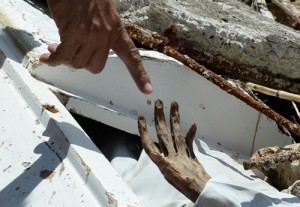THE World Health Organization (WHO) on Monday warned that infectious diseases could break out in areas flattened by Super typhoon Yolanda (international name Haiyan).
Dr. Julie Lyn Hall said a measles outbreak could happen in
the next few weeks because almost all of the medical facilities in Eastern Visayas particularly in Tacloban City were devastated by the typhoon.
She said the Department of Health (DOH), in coordination with WHO, will conduct a massive vaccination program to protect children against measles and polio.
“Only a few percentage of the children in the affected areas were vaccinated to fight measles, and so they should be vaccinated,” Hall said.
She added that at least 24,000 babies will be born this month.
“That’s a lot of babies that need to be delivered in clean conditions,” she said.
Hall called for the immediate restoration of birthing facilities to provide health care for newborns in the typhoon-ravaged provinces.
The United Nations Population Fund (UNPFA) said that some 230,000 pregnant women affected by the typhoon face higher risks of acquiring diseases.
“They urgently need assistance, particularly the restoration of maternal and newborn health services,” the UNPFA said.
The UNPF said that around 900 babies are born every day in the storm-hit areas. Mothers deliver their babies in makeshift clinics in the absence of functioning medical facilities and skilled birth attendants.
According to the group, each day, approximately 130 of these mothers will experience potentially life-threatening complications.
“In these situations, the sudden loss of medical support puts women and their newborns at higher risk of death or injury,” Genevieve Ah-sue, acting UNPFA representative in the Philippines, said.
The UNPFA said about 157,000 mothers who gave birth in the past six months as well as their babies need medical care.
“Babies continue to be born even in emergencies like this one, and women have to give birth without access to even the most basic essentials for safety delivery,” said Ah-sue.
As part of the United Nation’s (UN) Humanitarian Action Plan for Typhoon Yolanda, the UNPFA is releasing P172 million to restore health services, including maternal and newborn care.


